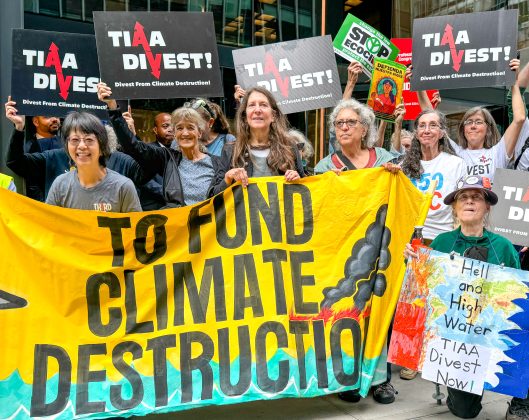Climate Week NYC (September 23-29) was a whirlwind of action for our Policy team, extending beyond New York City to key events in Washington, D.C. Here’s how ActionAid USA and our allies took bold steps for climate justice throughout the week.
Our activities began before Climate Week when our Senior Policy Analyst, Kelly Stone, spoke at the U.S. Fair Shares NDC virtual press panel on September 17, where she discussed a new report outlining what the U.S. climate action pledge to the international community, or its Nationally Determined Contribution (NDC), should look like. The “fair share” approach to climate action is determined by historical emissions and national wealth.
This has been a cornerstone of our climate work for many years. As countries begin to prepare their NDCs under the Paris Agreement, one thing is clear: these NDCs must be far more ambitious if the world is going to keep Paris Agreement goals within reach, and equity – in which richer countries pledge more ambitious action as well as support for poorer countries – is essential for that to happen. Relatedly, Kelly also spoke at the launch of the ShiftUS campaign, which aims to build a movement for international climate justice within the U.S., on September 21. The demand for the U.S. to meet its fair share of climate action is a key demand of the ShiftUS campaign.
During Climate Week itself, ActionAid USA’s team continued to push for systemic change. On Monday, September 23, ActionAid USA Senior Policy Analyst Doug Hertzler and ActionAid International’s Wangari Kinoti represented us at an action in New York City targeting Citi for its role in environmental racism. Activists from the Gulf South demanded a meeting with the company’s leadership. When Citi refused, activists staged a sit-in, effectively shutting down the company’s headquarters for the day. This powerful action showcased the resolve of communities directly affected by Citi’s destructive environmental practices.
The next day, Tuesday, September 24, ActionAid USA joined forces with TIAA-Divest, Stop Land Grabs campaign, Third Act, and TIAA-Exposed for a rally at TIAA’s headquarters. With over 70 participants, the rally called on the retirement fund giant to take responsibility for its investments in fossil fuels and industrial agriculture. Renowned activist Bill McKibben, Black farmers from Phillips County, Arkansas, and TIAA-Exposed members delivered compelling speeches, emphasizing the need for sustainable practices and divestment from harmful industries.
Later that day, the farmers shared their personal stories during a powerful event in NYC, attended by 80+ participants (in person and online). The event featured an insightful discussion on the fight for climate justice, with Brazilian activists joining to highlight similar challenges faced in their communities. Attendees engaged in a robust dialogue on strategies to strengthen the movement.
Also on Tuesday, ActionAid USA’s Senior Policy Campaigner Tristan Quinn-Thibodeau spoke on a panel titled “Coordinating a Global Just Food Transition” at a Climate Week conference hosted by the Tilt Collective. Tristan emphasized the critical role of fair pricing for family farmers and the importance of promoting smaller, agroecological farms. ActionAid has been actively promoting just transitions in agriculture globally and in the U.S. For more information, see ActionAid International’s 2019 global report and ActionAid USA’s one-pager focused on the U.S. context.
Finally, back in Washington DC, on Thursday, September 26, our Director of Policy and Campaigns, Brandon Wu, joined Representative Greg Casar and a variety of Congressional and civil society leaders at a press conference at the Capitol to launch the Migration Stability Resolution. The resolution and the launch event highlight the urgent need for reform of harmful U.S. foreign policies – economic, military, climate, and more—that underlie forced migration. While the Migration Stability Resolution is focused on addressing the root causes of forced displacement abroad, some of the exact same dynamics are at play when it comes to policies that harm vulnerable communities in the United States, like those we showed up for earlier in the week in New York.
From the streets of NYC to the grounds of the Capitol, Climate Week was a powerful week of advocacy and action for climate justice, strengthening our global movement for a just and sustainable future. We will be building on these efforts – for climate justice, land rights, migrant justice and more – through the upcoming UN climate negotiations in Baku, Azerbaijan this November and beyond.



